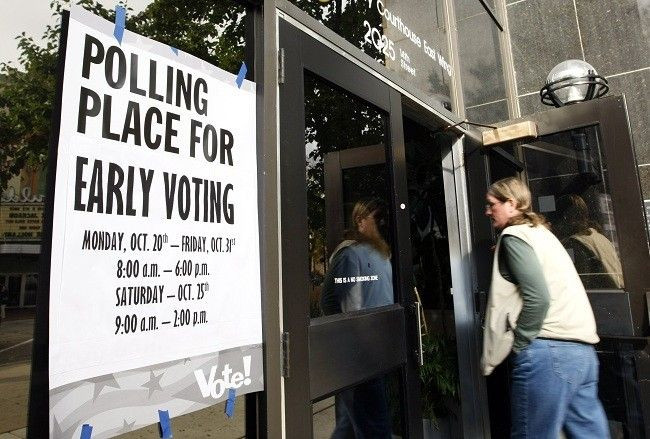Voter ID, Registration Laws May Affect 5 Million Americans in 2012 Election: Report

The crush of voter ID laws and other efforts placing barriers to the polls may affect 5 million people next year -- tilting the electoral landscape away from Democrats going into the 2012 campaign season, according to a report released Monday.
The Brennan Center for Justice says that millions of voters eligible in 2008 may be kept from the polls because of laws requiring voters to show government-issued photo identification, cutting back on early voting and tightening registration rules.
These new laws have been introduced in statehouses across the U.S. after the 2010 midterm elections resulted in GOP control of 54 out of the 99 state chambers, according to the National Conference of State Legislatures.
According to the report, 19 new laws and two new executive actions are in place, with 42 still pending.
Lawrence Norden, deputy director of the Brennan Center's Democracy Program, questioned the effectiveness of requiring photo ID at the polls. He argued that photo ID will only prevent someone from impersonating a registered voter.
If you want to impact an election, it's not a very good way to do it, Norden said of impersonation voting. I don't think anybody that's fair minded wants voter fraud. The question is, what are you doing to prevent that kind of crime and is there a way of doing it so you are not disenfranchising people.
Each state with new voting laws has implemented different requirements for getting to the polls. For instance, Alabama, Kansas and Tennessee are three of 12 states that require voters to show proof of citizenship, such as a birth certificate. Seven states, such as Wisconsin, South Carolina and Rhode Island, passed laws requiring photo ID.
It's a real burden, and it means some people will not be voting, Norden said.
Democrats: Laws Designed to Discourage Poor, Minorities From Voting
Democrats have fumed at new laws that aim to curtail alleged voter fraud, as they mainly fall on the party's base: poor, young and minority voters. Rural voters, too, are affected as well, the study said.
A Texas state senator in August called the state's voter ID law voter suppression. The Florida Democratic Party in May called the state's voter laws an attack on the voting rights of all Floridians and a power-grab by Republicans.
The report suggests an altered electoral landscape for Democrats if the effects of these laws do curtail voter participation as critics say. States with these voter laws hold 171 electoral votes, according to the report from the nonpartisan Brennan Center.
Norden said that some states voter ID laws seem directed at Democratic voters, like students.
When you look at a state like Texas that allows a concealed handgun license to be used for identification purposes but not an ID from a state university, it becomes pretty apparent who this law is impacting and who it's not, he said.
But the problems voter ID law critics say will occur never actually do, argues Hans von Spakovsky, senior legal fellow at the Heritage Foundation, a conservative think tank.
If you look at the elections that occurred in Georgia and Indiana -- states that implemented voter ID laws in 2005 -- none of the things they're predicting have happened, von Spakovsky said. The turnout of the elections show that the supposed claim that it would depress turnout of minority or elderly voters has been proven to be untrue in the polling place.
He also argued that requiring photo identification to vote blocks a host of fraudulent activity, such as preventing illegal immigrants/undocumented workers from voting, voting under fake registration and double voting.
This is a very basic security requirement from preventing that from happening, von Spakovsky added.
© Copyright IBTimes 2024. All rights reserved.





















